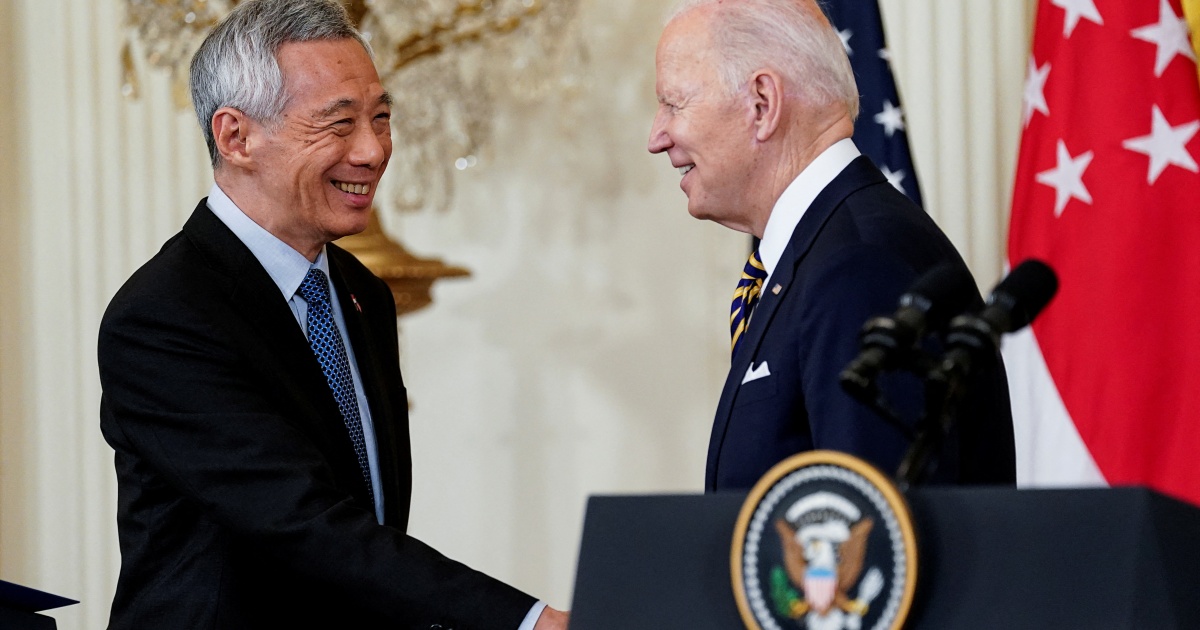Biden says Asia-Pacific region still a priority amid Ukraine war
US President Joe Biden has warned that the war in Ukraine threatens the “rules-based international order”, including in the Asia-Pacific region, where Washington is locked in growing competition with Beijing.
Speaking at the White House on Tuesday alongside the prime minister of Singapore, Lee Hsien Loong, Biden said “all nations” have a right to territorial integrity and sovereignty regardless of their size or population.
“It’s clear that Putin’s war is unacceptable to nations in every region in the world – not just in Europe but in every region of the world,” Biden told reporters. “It’s an attack on the core international principles that underpin peace and security and prosperity everywhere.”
That was echoed by Lee, who spoke out against Russia’s invasion of Ukraine and said “the sovereignty, political independence and territorial integrity of all countries, big and small, must be respected”.
The meeting came as the United States continues to threaten China with “consequences” if it comes to Russia’s aid in Ukraine and separately pushes back against Beijing’s growing influence in the Asia-Pacific.
While the conflict in Ukraine has dominated attention globally, Biden said his administration “is strongly supportive of moving rapidly to implement the Indo-Pacific strategy”.
The Biden administration announced that strategy in February, pledging to commit more diplomatic and security resources to the region to counter what it sees as China’s bid to create a regional sphere of influence.
Biden also said on Tuesday that he wanted to ensure that the region remains “free and open” – a reference to what the White House sees as attempts by China to dominate international trade routes.
For his part, Lee urged closer ties between the US and the Association of Southeast Asian Nations (ASEAN), saying “it helps the US to be present in the Asia-Pacific and to deepen its relations with many friends and to strengthen its strategic interests in the region”.
“The war in Ukraine has a negative impact on the Indo-Pacific region, which already faces many complex challenges. Taken together, the opportunities and challenges of the 21st century demand deeper cooperation between us,” Biden and Lee also said in a joint statement.
China competition
Biden had been due to host leaders of the 10-nation ASEAN group, of which Singapore is a member, this week, but the summit was postponed because not all leaders could attend on the March 28 and 29 dates announced by the White House.
In advance of the Biden-Lee meeting, a senior US administration official told reporters that the White House is working to reschedule the event. “We believe the clock is ticking and we want to try and get this done,” the official said.
Lee’s trip comes after Vice President Kamala Harris, US Secretary of Defense Lloyd Austin and US Secretary of Commerce Gina Raimondo visited Singapore last year. Biden last spoke with Lee at the G20 summit in Rome.
Singapore is a key financial and trading centre and has been keen to hear details of US plans for an Indo-Pacific Economic Framework (IPEF).
Meanwhile, the Ukraine war has tested the US-China relationship, with Washington pushing Beijing – which has taken a neutral stance on the conflict and urged de-escalation – to do more to rein in Russia.
Bilateral ties between the US and China already were strained amid a range of issues, including Taiwan, the South China Sea and Beijing’s human rights record.
In the South China Sea, parts of which are also claimed by the southeast Asian nations that surround it, Beijing has built artificial islands and developed rocky outcrops into military bases, deploying its Coast Guard and a maritime militia to back its claim to almost the entire sea.
In their statement on Tuesday, Biden and Lee reiterated their support for “ASEAN-led efforts to develop an effective and substantive Code of Conduct for the South China Sea that upholds the legitimate rights and interests of all parties”.
They also called on North Korea, which last week tested a powerful new type of intercontinental ballistic missile, to halt such launches and return to negotiations over its weapons programme. “We both urge North Korea to refrain from further provocations and return to the negotiating table for serious and sustained diplomacy,” said Biden.
North Korea thus far has rejected US appeals to hold direct talks over its nuclear and missile programmes.
Ukraine negotiations
Meanwhile, Biden said it remains to be seen whether Russia follows through with any actions to scale down its military operations in Ukraine, saying Washington and its allies will continue with strong sanctions and aid for Ukraine.
“We’ll see if they follow through with what they’re suggesting,” he told reporters. “We’re going to continue to keep a close eye on what’s going on.”
Earlier on Tuesday, Ukrainian and Russian negotiators met for face-to-face talks in Istanbul, Turkey, after several previous rounds of negotiations to end the conflict failed.
Moscow said it was ready to “fundamentally cut back” military activity near the Ukrainian capital of Kyiv and the northern city of Chernihiv, in what Deputy Defence Minister Alexander Fomin said was an effort “to increase trust” in the talks.
On the Ukrainian side, negotiators said they were willing to agree to a neutral status – one of Russia’s key demands – if an international agreement under which other countries would serve as guarantors of Ukraine’s security would come into place.











